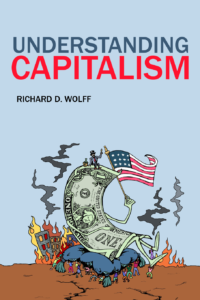How To Tackle The Climate Crisis And Inequality

James K. Boyce – Photo by Matthew Cavanaugh
08-12-2024 ~ Carbon dividends, public investment, and binding carbon-emissions reductions to commensurate reductions of toxic air pollutants from fossil fuels are three policies that narrow inequality rather than widening it.
Our planet is warming up at a record rate. Scientists believe that the climate is warming up as a consequence of the increase in greenhouse gases. Studies have also shown that there is a link between climate change and inequality. Yet, the global economy continues to be overly dependent on fossil fuels—oil, natural gas, and coal—which are by far the largest contributor to global warming. What does all this say about current climate policies and the goal of achieving carbon neutrality by 2050? And how do we address the twin challenges of inequality and climate change?
In the interview that follows, progressive political economist James K. Boyce sheds light on the above questions. James K. Boyce is a senior fellow at the Political Economy Research Institute at the University of Massachusetts Amherst, and recipient of the inaugural Global Inequality Research Award. He is the author, among many other works, of The Case for Carbon Dividends and Economics for People and the Planet: Inequality in the Era of Climate Change.
C. J. Polychroniou: Over the past several years, climate records have been repeatedly broken. Last year was the planet’s hottest by a huge margin since global records began in 1850, and 2024 is on course to break that record again. Are climate policies designed to reduce greenhouse gas emissions working, especially when we have wars going on that contribute significantly to climate change? Indeed, with everything going on, which includes increased demand for oil, is it at this point even realistic to expect that we can achieve climate neutrality by 2050?
James K. Boyce: You’re right, it’s getting hotter year by year. This is no surprise: it’s exactly what we can expect until the world reaches climate neutrality (net-zero emissions of greenhouse gases). Some climate policies are working better than others—it is not as if nothing is happening. Renewable energy from solar and wind has become cost-competitive more quickly than most people expected. But we are not on track to achieve climate neutrality by 2050. To do so we would need to phase out the use of oil, natural gas, and coal. Instead, global consumption of all three fossil fuels is at an all-time high.
You are right, too, that wars exacerbate the problem. They distract attention and resources from addressing the climate crisis, and they add to greenhouse gas emissions. In just the first two months of the war in Gaza, for example, carbon emissions (mostly from Israeli warplanes and U.S. weaponry supply flights) exceeded the annual emissions of 20 countries, according to a team of U.K. researchers. Postwar reconstruction, once this latest round of bloodshed ends, is likely to release much more.
You ask whether it is “realistic” to expect that we can achieve climate neutrality by 2050? Obviously not if we continue on this path.
Yet it is realistic to say that it is possible to achieve it. There is no technical reason it cannot be done: the obstacles are political. To do it, each country would need to set a hard ceiling on the quantity of fossil fuels entering its economy, a cap that declines year-by-year on a path to net zero. Restrictions on the supply of fossil fuels would raise their price—possibly a lot. But instead of the money going to into the bank accounts of oil producers, as happens when OPEC and oligopolistic corporations restrict their output to boost prices, the money could go directly back to the public on an equal per person basis with a cap-and-dividend system. This would maintain the real incomes of working people in the face of rising fuel prices, and it would make a modest contribution to addressing the other great challenge of our time, curbing rampant inequality.
I wish I could tell you this will happen sooner rather than later. But the political stars do not seem to be favorably aligned at this moment. That said, the climate crisis is not going to disappear. Pretending it’s not real doesn’t make it any less real. It will keep worsening unless and until we achieve climate neutrality.
Think about that: it will keep getting worse. Climate change is not like a cliff, where once we fall off the edge it is too late to do anything. Instead, it is a cascade of damages, with costs that grow exponentially over time. To proclaim that before long it will be “too late” to do anything about it would be irresponsible and misleading. Each ton of carbon is more harmful than the one that came before. Each day we delay, the need for action becomes more urgent, not less.
C. J. Polychroniou: There is a global backlash on climate action. The pushback against climate policies comes from the fossil fuel industry and major corporations, Europe’s far right, and the Republican Party in the U.S. But this wrecking-ball strategy seems, unfortunately, to be paying off as we still lack sufficient public and political will for bold climate action. Could things be different if plans to combat climate change effectively addressed environmental and social concerns? Indeed, where do things stand with regard to just transition and environmental justice?
James K. Boyce: Denial of the reality of climate change was the first line of defense of the fossil fuel lobby. But this could work for only so long. As the results of climate destabilization become ever more apparent, denial becomes ever more untenable. Of course, there are some who will cling to it. There are still people who insist the world is flat. But most people cannot be persuaded to keep their heads in the sand most of the time.
So today the industry has fallen back on its second line of defense: the claim that cost of moving away from fossil fuels would be unacceptably high, undermining the living standards of working people at home and abroad. The distinguished economist John Kenneth Galbraith anticipated this tactic more than 50 years ago. In his 1972 presidential address to the American Economics Association, he observed that in pursuit of private profits, corporations seek to persuade the public that pollution is “palatable or worth the cost.”
It is an open question how the costs of the transition to a net-zero economy will be distributed across the population. This is a policy choice rather than a foregone conclusion. With the right policies, the clean energy transition can raise living standards for working people rather than lowering them. What is certain is that climate change, left unchecked, poses a grave threat to human well-being, above all to the well-being of working people who cannot afford to buy private shelter from the approaching storm.
The groundwork for this line of defense was prepared when oil corporations launched a concerted effort to shift the blame for the climate crisis onto consumers. It is a twist on the classic scoundrel’s stratagem of blaming the victim. Two decades ago, BP (the former British Petroleum) propagated the notion of individual “carbon footprints,” complete with a handy online calculator and then a phone app to tell you how much carbon is released when you drive to the grocery store or eat a hamburger. The underlying message was evident: Our customers are the real problem, not us. In orthodox economic theory, this ideological buck-passing has a fancy name: “consumer sovereignty.”
Environmentalists often fall into the same trap when they, too, blame consumers rather than the corporate and government power brokers who dictate the playing field for consumer choice. The claim that ordinary people must “tighten their belts” and endure sacrifices to save the planet appeals to a finger-wagging element in the environmental movement, but it is antithetical to building the broad public support we need for climate action.
Could things be different? You bet they could. Climate policy, if done right, will bring large and tangible benefits to people around the world. As with any addiction, weaning ourselves from dependence on fossil fuels will free us from the grip of pushers masquerading as benefactors. It will open the door to cheaper and more reliable sources of energy. It will end toxic air pollution from burning fossil fuels that annually causes millions of premature deaths. Because investments in energy efficiency and clean energy are more labor intensive than fossil fuel production, it also will create lots of new jobs. All this is on top of preventing further exacerbation of the climate crisis.
For this to happen, however, policies must be designed with these benefits firmly in mind. Just transition policies are needed to ensure that communities that have depended on the fossil fuel industry in the past are not only cushioned from the costs of the transition but actually gain new and better economic opportunities. Environmental justice policies are needed to ensure that communities that have experienced disproportionate costs from fossil fuel pollution are first in line to benefit from cleaner air and water. And as I already mentioned, a carbon price-and-dividend policy is needed to protect and raise the real incomes of working people even in the face of rising prices for fossil fuels as their supply is phased out.
None of these policies are impossible. But none of them will happen as long as the fossil fuel lobby and its cronies are calling the shots.
C. J. Polychroniou: You are one of the very first economists to address the political economy of the environment. Climate change seems to be deeply intertwined with global patterns of inequality. What specific measures do you propose for addressing the twin challenges of inequality and the climate crisis?
James K. Boyce: Political economy is about the allocation of scarce resources not only among competing ends—that is the textbook definition of economics—but also their allocation among competing people, competing individuals, groups, and classes. In other words, it is about who as well as what.
Whenever we encounter environmental degradation, we can pose three questions: Who benefits? Who bears the cost? And why are those who benefit able to impose this cost on others? Inequalities of wealth and power are deeply implicated in answers to the last question. Much of the cost of climate change will fall upon future generations who are not here to defend themselves. The only way to redress this inherent power imbalance is to develop an ethic of intergenerational responsibility. But significant costs are imposed on people alive today, too. This has long been the case for frontline communities polluted by the extraction and combustion of fossil fuels. Now the costs are spreading to people everywhere who are suffering from more frequent and more intense droughts, floods, wildfires, hurricanes, and heatwaves.
The ability of those who capture the lion’s share of the benefits from fossil fuels—big corporations and rulers of petrostates—to impose enormous environmental costs on others is a symptom of stark inequalities in the distribution of wealth and power. Anything we can do to rectify this inequality will make it easier to address the climate crisis. And anything we can do to address the climate crisis will make it easier to rectify this inequality.
Reducing the inequalities within and among countries cannot be achieved with the snap of a finger. It requires action on many fronts, including taxation, trade, investment, and international finance, some of which we have discussed before.
But in the meantime, we can implement climate change policies that narrow inequality rather than widening it. Let me elaborate a little more on three of these policies.
Carbon dividends would return money to the people from putting a price on carbon emissions by means of either a tax, a cap with auctioned permits, or a combination of the two (in which the tax serves as the floor price in permit auctions, combining downside price certainty with upside emissions certainty). A carbon dividend policy is already in place in Canada. The Canadian policymakers made an initial blunder, in my view, by rebating the carbon revenue to the people via an income tax credit, rendering it practically invisible to most people. Fuel prices, on the contrary, are advertised in foot-high numbers at gasoline stations around the country. The fossil fuel lobby and its political allies have tried to paint higher fuel prices as an awful burden on working families, while ignoring the money coming back to them as dividends. To debunk these predictable efforts, carbon dividends must be as visible as the price of gasoline at the pump. Paying dividends via direct, stand-alone payments—the proverbial “check in the mail” or clearly labeled direct deposits into personal bank accounts—is crucial for this reason. The Trudeau government belatedly realized this and changed to direct payments. But whether Canada’s policy survives will depend on the outcome of the upcoming national elections.
A second climate policy that can also be a vehicle to reduce inequality is well-targeted public investment. This was a focus of the Biden administration in the United States. Public investment can be directed so as to reduce inequalities between regions and communities. Just transition investments in fossil fuel-dependent localities and environmental justice investments in the communities hardest hit by fossil fuel pollution are examples of this. More generally, investment can and should be steered to rural and urban areas that in recent decades have experienced collapsing incomes and shrinking economic opportunities.
A third way in which climate policy can reduce inequality is to bind carbon emissions reductions to commensurate reductions in emissions of toxic air pollutants from fossil fuels—sulfur dioxide, nitrogen oxides, and so on—by means of an “environmental justice guarantee.” Such a guarantee would mandate that overall reduction in carbon emissions is matched by reductions in co-pollutant emissions in communities disproportionately impacted in the past. Such a guarantee is included explicitly in the Healthy Climate and Family Security Act of 2022 introduced by U.S. Sen. Chris Van Hollen (D-Md.)
None of this will happen without popular mobilization. Democracy was not handed to us on a platter. The abolition of slavery was not delivered on a platter. Neither were women’s suffrage, civil rights, or environmental protection. Throughout history, pro-people change happens only when ordinary people demand it. That is what needs to happen now.
Source: https://www.commondreams.org/opinion/tackle-climate-crisis-inequality
Our work is licensed under Creative Commons (CC BY-NC-ND 3.0). Feel free to republish and share widely.
C.J. Polychroniou is a political economist/political scientist who has taught and worked in numerous universities and research centers in Europe and the United States. His latest books are The Precipice: Neoliberalism, the Pandemic and the Urgent Need for Social Change (A collection of interviews with Noam Chomsky; Haymarket Books, 2021), and Economics and the Left: Interviews with Progressive Economists (Verso, 2021).

 08-07-2024 ~ Ancient human retrovirus DNA could be one of the markers of susceptibility to mental illness—specifically schizophrenia, bipolar disorder, and major depressive disorder, a new study suggests.
08-07-2024 ~ Ancient human retrovirus DNA could be one of the markers of susceptibility to mental illness—specifically schizophrenia, bipolar disorder, and major depressive disorder, a new study suggests.